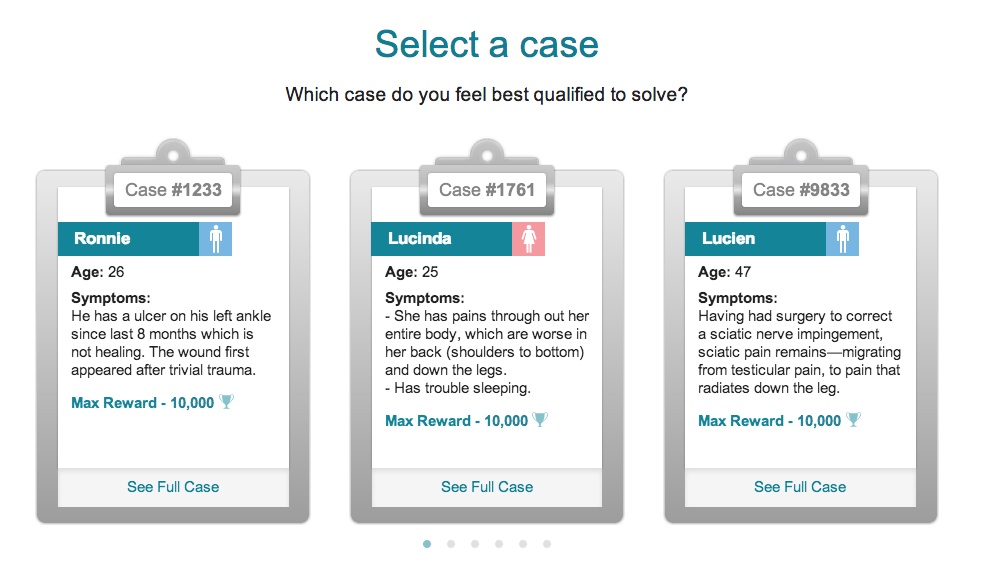Prediction markets have been used to predict everything from Oscar winning films and box office trends to the outcome of presidential elections, often with impressive accuracy. Now a new startup called CrowdMed aims to use a prediction market in healthcare. The Y Combinator-backed startup just raised $1.1 million in seed funding to use "the wisdom of crowds" to give diagnostic suggestions to patients with obscure or baffling medical conditions.
The theory of a prediction market is that when a large enough population bets real or fake money on predictions in a system similar to a stock exchange, their bets will reflect their confidence and, in aggregate, will create a robust predictive model. CrowdMed founder Jared Heyman worked with predictive markets in his last job at market research firm Infosurv. He also watched his sister live for three years with a potentially fatal disease that her doctors couldn't figure out. Putting those two experiences together, he decided to build CrowdMed.
"Prediction markets are very good at extracting the right knowledge from the right people," Heyman told MobiHealthNews. "There's lots of reasons for this. You can look as prediction markets as a simple voting system. If you feel very confident, you will express that confidence to us by how much you're willing to bet. They have something to lose by getting it wrong and something to gain by getting it right. By asking people to put their money where their mouth is, we're really getting a sense of peoples' confidence."
 Like many predictive markets in the United States, CrowdMed uses a virtual currency. However, according to Heyman, users will be able to trade in their points for real-money donations to charities. On the CrowdMed platform, which has recently moved from a private to a public beta, users can sign up to be either a patient or a medical detective (or "MD" on the site.) Patients give CrowdMed all the information they have about their medical quandary: symptoms, family history, and test results. Those cases are de-identified and presented to the MDs, who can suggest a diagnosis or bet on the diagnoses that have already been suggested. If their diagnosis proves correct, they make as much as they bet in the site's virtual currency.
Like many predictive markets in the United States, CrowdMed uses a virtual currency. However, according to Heyman, users will be able to trade in their points for real-money donations to charities. On the CrowdMed platform, which has recently moved from a private to a public beta, users can sign up to be either a patient or a medical detective (or "MD" on the site.) Patients give CrowdMed all the information they have about their medical quandary: symptoms, family history, and test results. Those cases are de-identified and presented to the MDs, who can suggest a diagnosis or bet on the diagnoses that have already been suggested. If their diagnosis proves correct, they make as much as they bet in the site's virtual currency.
"We're not assuming that you as a random person would be well-equipped to solve a particular case," Heyman said. "But if we have a lot of people and a lot of cases, it's not unlikely that someone in the crowd has a particular knowledge. Even though I'm not a doctor, if I was sitting next to someone on an airplane who had a very similar symptom set to my sister's, I would say 'I'm not a doctor, but you should look into what my sister had.' So we're trying to take that same phenomenon and add a lot more structure to it."
Of course, CrowdMed doesn't purport to replace doctors or offer diagnoses, only "diagnostic suggestions".
"When I talk in terms of CrowdMed producing diagnoses, I'm talking about diagnostic suggestions for you to discuss with your doctor," Heyman said. "We are simply trying to produce a short list of highly likely diagnostic possibilities. It's up to your doctor to confirm the diganosis and prescribe treatment. Our job is to narrow the field from 8,000 possibilities down to the two or three that are the most likely."
CrowdMed's seed investors include NEA, Andreessen Horowitz, Greylock Partners, SV Angel (Ron Conway's fund), and Y Combinator. Heyman said he decided to participate in Y-Combinator rather than in a health-specific incubator because he considers CrowdMed to be as much a consumer web company as a healthcare company.
Following some press attention from their launch at TEDMED, the company is doing a second speed round to secure additional seed funding on top of the $1.1 million. The startup plans to use the money for continued product development and marketing. But Heyman said the platform has already worked to identify 20 different real-life conditions that were previously solved and confirmed, though often only after many years and dozens of doctors. Heyman says the biggest challenge right now is recruiting medical detectives to participate in large enough numbers to make the platform truly and reliably effective.













